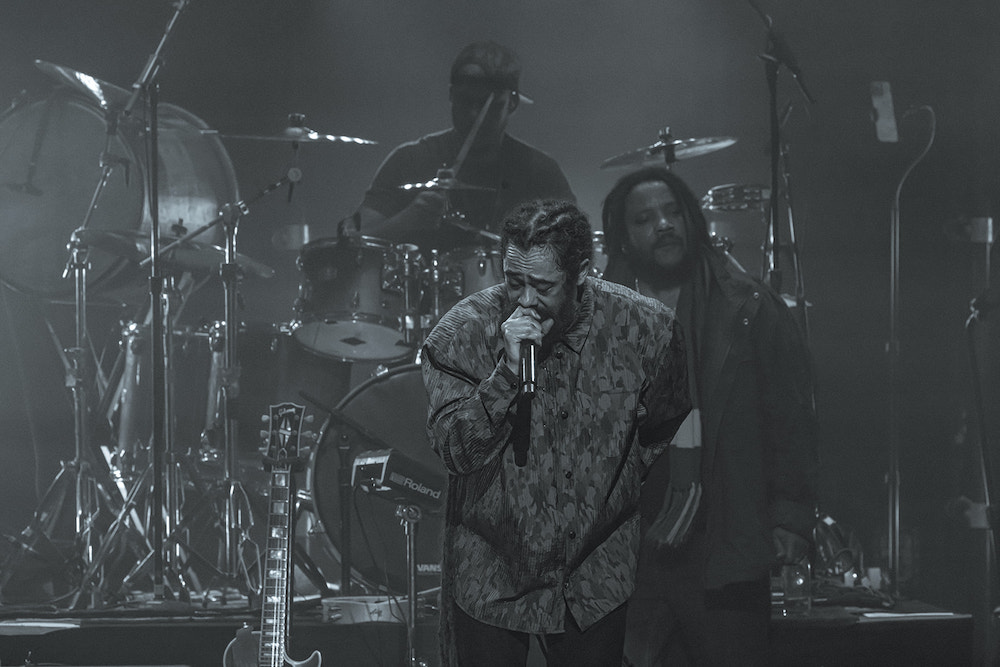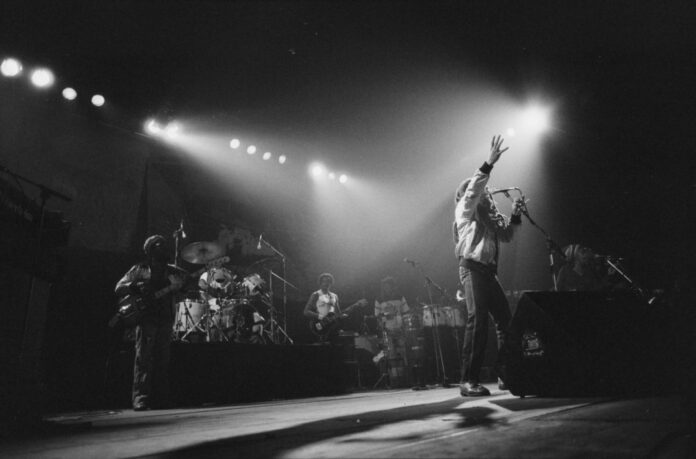Sometimes when we talk about Bob Marley & The Wailers, we forget the main thing: The unit was a groundbreaking ska and reggae band that conquered the world.
As hard as it is to believe, sometimes the most obvious thing gets lost.
On September 19 and 20, 1980, Marley and the Wailers co-headlined with the Commodores at Madison Square Garden in New York City. It was in the second half of the ’70s, during an era in which Marley demanded to play gigs aimed directly at Black audiences in the US. He felt as though his music was not reaching “his people”.
So here you have a slickly produced R&B band with a funk gloss sharing the stage with a bluesy, gritty, skanking band from Jamaica just gathering steam, gig by gig. Supposedly, Marley invited Lionel Ritchie to his dressing room to hang out. Maybe they smoked. What do you think?
All we have on record is a New York Times reviewer digging the new plucky, lionhearted band that was overtaking the culture. “After Mr. Marley’s intense singing and electric stage presence, the Commodores were a letdown,” he reported.
No surprise, right? I’m sure when Bob Marley and The Wailers played their last show in The Bay at RingCentra Coliseum (now known as the Oakland Coliseum) on November 30, 1979, it was a party too.
But sometimes when you’re balancing out Bob, the poetry, the assassination attempts, the political stances, the family turmoil, the way Island Records monetized his legacy into a billion-dollar lifestyle brand with Legend: The Best of Bob Marley and the Wailers compilation … and so many other topics, what should be clear gets muddled.
Burnin’ by The Wailers was the record that introduced me to this vastness, and I feel so lucky that’s the case. Even when I was very young, I was checking for those beats, so when the last 57 seconds of “I Shot The Sheriff”, when the bass and drum are just cooking and the piano and organ are just vamping—eww. Funkface central baby. It called out to me.
The Wailers, with or without their sermon giver sangin, were a groove-forward, full-on powerhouse unit.
Let’s momentarily set aside why they were gigantic to those who had no voice on the world stage. The fact that Bob Marley, who passed away at 36 from cancer, served as a global ambassador for reggae music and sold over 20 million records throughout his career with the band, making him the first international superstar to emerge from the so-called Third World, is paramount, Jack. He’s in Fela territory. But let’s get back to that main thing.
(And real quick: Listen, I have no idea how Reinaldo Marcus Green’s biopic Bob Marley: One Love portrays the performer. I’ve yet to see it. But I know the following without having to steal a look at a single frame of the film.)
If the band, in real life and on wax, was not hittin’, none of the accolades, magical achievements, or legacy branding ideas would have been entertained. A messiah needs an exceptionally transcendent ensemble to pound the message home.
During the mid to late ’70s, Peter Tosh and Bunny Wailer had left the group, The Wailers were comprised of brothers Carlton and Aston “Family Man” Barrett on drums and bass, Tyrone Downie on keyboards, Alvin “Seeco” Patterson on percussion, and the I Threes—Rita Marley, Marcia Griffiths, and Judy Mowatt—on backing vocals, along with newest member Julian (Junior) Marvin on guitar.
It was a unit that could dig in hard on Carlton and Ashton’s skank, rough and rugged, have Junior Marvin drop tear innit guitar solos with that backing vocal trio—they were on par with Ray Charles’ Raelettes and Stevie Wonder’s Wonderlove band. Just as important as any musician in the outfit, The I-Threes uplifted the poetry, and articulated the message by broadcasting the soon-to-be reggae songbook with verve, sass, and utmost royalty. This superstar line-up had that earthy organ grounding, whispering vocals from the I-Threes, and a very skillful rhythm section makes the groove undeniable. Like a classic Robert Altman flick, the ephemera taking place in the background of the era’s tracks carries just as much, or even more, weight in support of whatever lyric Bob is delivering high up in the mix.

>>LIVE SHOTS: STEPHEN AND DAMIEN JAM DURING HIGH MARLEY MOMENT AT THE MASONIC<<
Yes, he knew the multifaceted engine he had cooking under that hood. His growing audience could hear it, too.
Parliament Funkadelic, Journey, The Jacksons, Queen, The Bee Gees, Pink Floyd, Cher, Rod Stewart, The Who, Wings, Rolling Stones, Fleetwood Mac: All of these road-warrior outfits made big coin and sold massive amounts of records when “reggae music” popped up and started to kick bands like Rush and Boston to the curb, scratching out a spot in US radio play.
That’s the musical climate in which Bob Marley & The Wailers were making their own space when they played The Matrix in SF in ‘73, ripping off a four-night, sold-out run at the Boarding House at 960 Bush St, from July 4-7 in 1975, and at Berkeley’s Greek Theatre on July 21, 1978.
Uprising was the last album by Bob Marley to be released in his lifetime. According to lore, on the day it reached the shops on June 10, 1980, Marley and the Wailers opened for Fleetwood Mac at the 69,000-capacity Reitstadion in Munich. It was the second night of the Uprising tour, a European trek that took them to some of the biggest venues on the continent and to several countries they hadn’t played before, including Switzerland, Ireland, Scotland, and Italy.
But the biggest honor of sorts, before Marley’s passing, was The Wailers’ debut at the historic Apollo Theater in Harlem in 1979. They played a historic run of shows from October 26-29, 1979, performing two shows on each of those four nights. George Clinton and Parliament Funkadelic opened several shows, with vocalist Betty Wright opening the rest. The Wailers would be the last act to play in the theater before it went dark for five years and reopened in 1984. Bob Marley and The Wailers knew how to close a venue, too.





